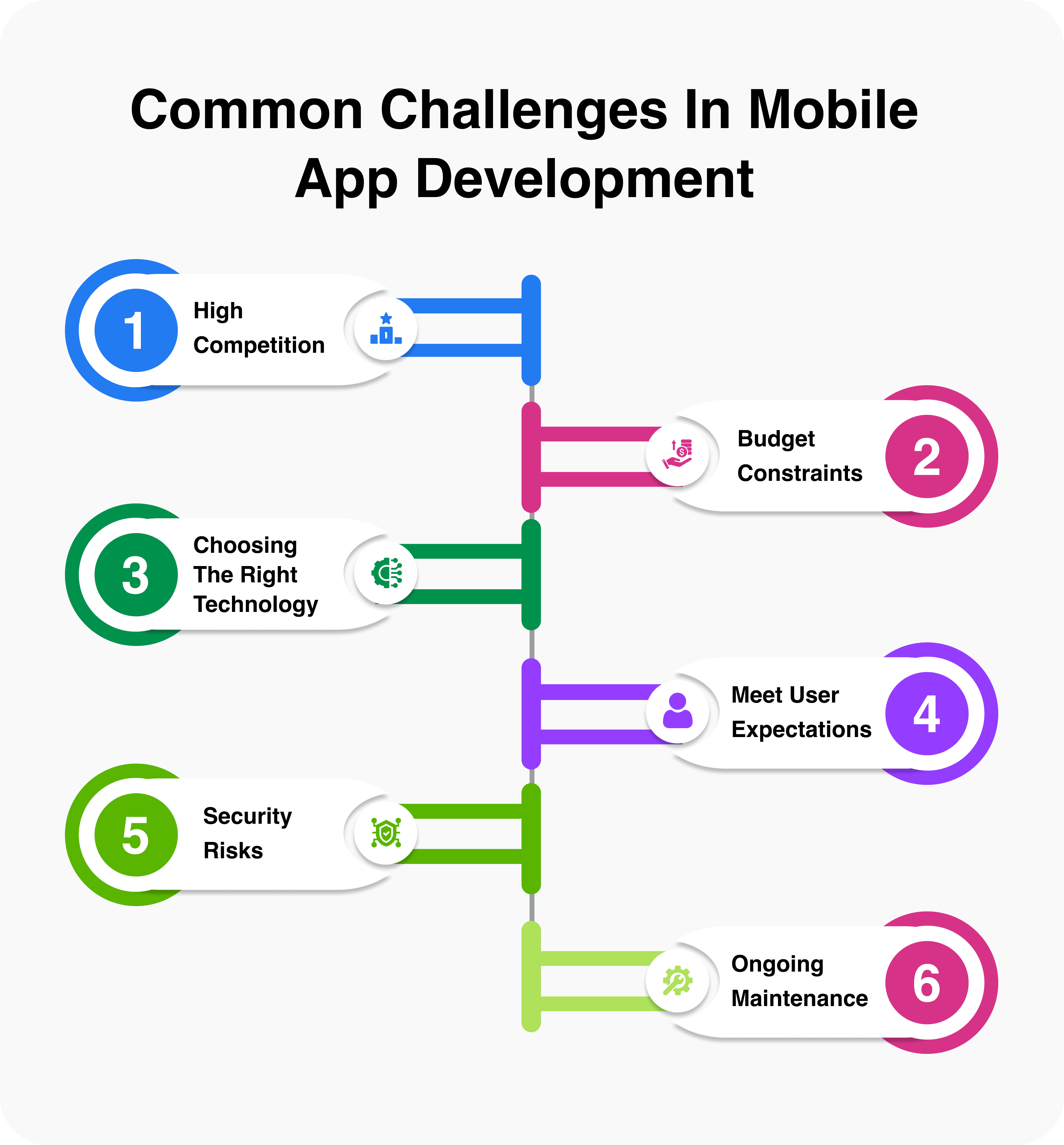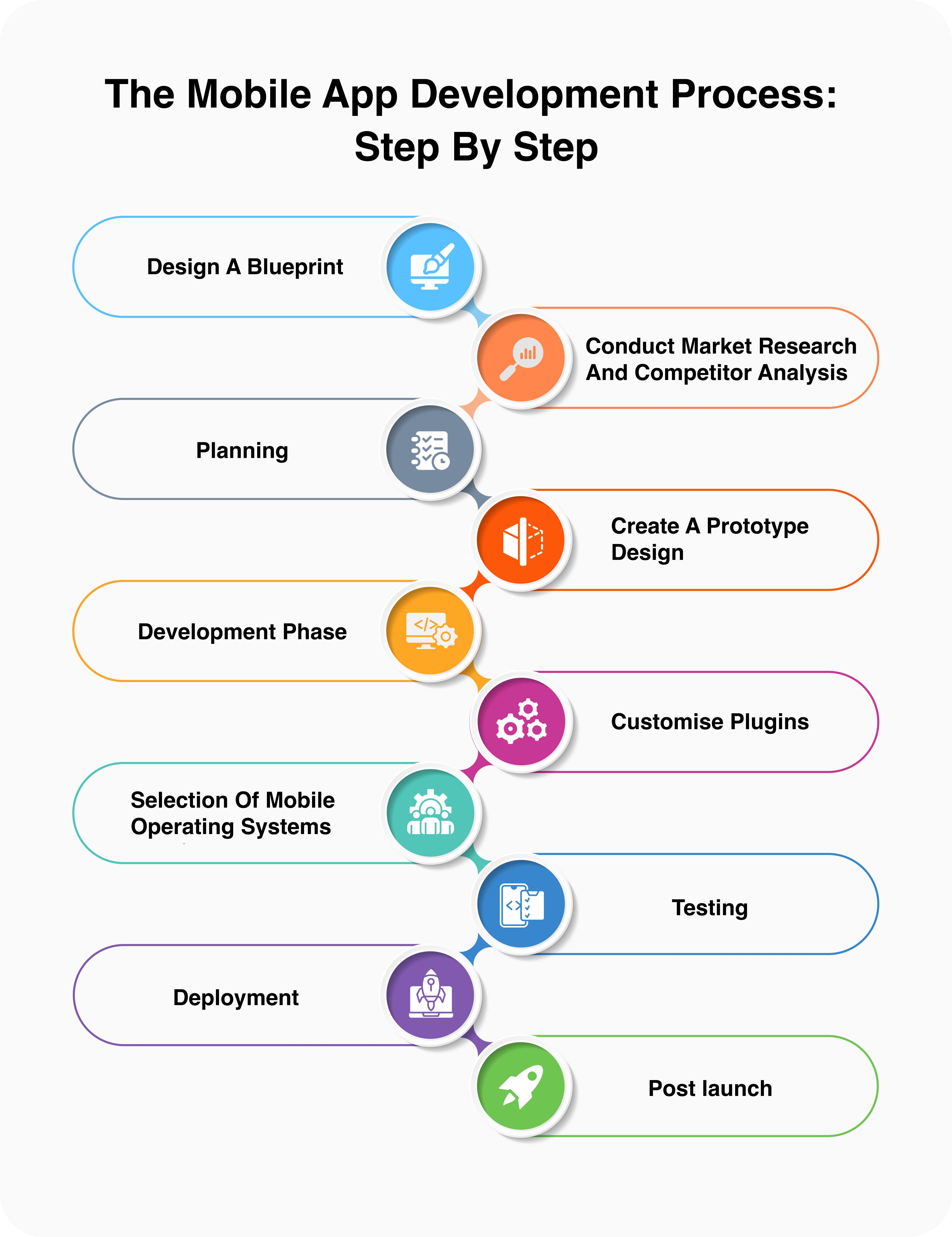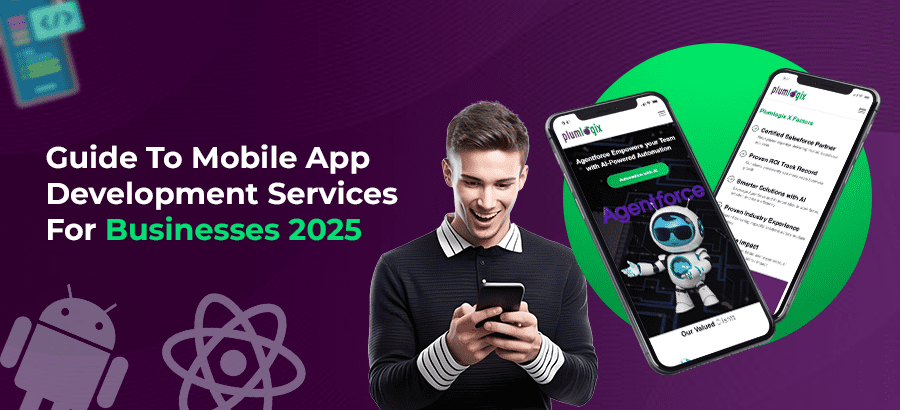About Mobile App Development, Trends, and Costs in 2025
Not long ago, having even a website for the business was fancy. Today, that is not even the case now in 2025; having a mobile app is a must for the business. It is just a way for futuristic brands to stand out. Even more, they have become the core business tools.
Also, they drive customer engagement, improve internal workflows, and create entirely new revenue streams. Let numbers speak for themselves: 6.9 billion people worldwide use smartphones GSMA, 2024, which means your customers and employees are already living on mobile devices. Moreover, it is suggested that by 2026, 70% of all e-commerce sales will come from mobile devices.
So, the question that arises here is, what is mobile app development?
What Does Mobile App Development Services Mean?
Whenever people say “custom mobile app development services,” they are talking about a complete package of everything you need to create and run an app. It is not just about writing code, but also about:
- Planning: What do you want your app to do? Who will use it and how?
- Designing: To make sure the app looks good and is easy to use.
- Building: Coding the mobile app so it works on iPhones and Android Phones.
- Testing: Checking for bugs, crashes, and speed problems.
- Launching: Putting it on the Mobile App Store and Google Play Store.
- Maintaining: Updating old ones and adding new features. Sometimes it’s about fixing issues and keeping it secure.
Think of it like building a house, where you don’t only hire someone with nails. But you hire the whole team of architects, engineers, builders, inspectors, and maintenance workers. Mobile phones are built the same way, and good mobile app services cover the whole journey for you.
Want to skip the whole blog and directly hear from the experts in just 30 minutes for free? Let us discuss your goals, challenges, and ideas.
Importance And Benefits Of a Custom Mobile App
To understand the benefits of mobile app development services better, let’s break it into two groups: customer benefits and business goals. So, let’s get started:
Benefits Of A Custom Mobile App?
What benefits are the outcomes that our customers get? Some of the prominent ones are the following:
- It eases their way to buy or book with the help of one-tap shopping, online payments, and quick bookings.
- Enhance their brand experience with smooth designs, personalised offers, and even loyalty programs.
- 24/7 available mobile apps work faster than websites and can work offline too.
Why Build An App For Your Business?
Now let’s discuss how apps help businesses achieve their goals.
- As customers return more often when they use an app, it enhances their loyalty.
- Some of the app features, like push notifications, remind users to offer enhancements to their sales.
- Smart mobile apps track customer behaviour, what they buy, and when they buy, which brings the data insights.
- Last but not least, internal apps save time for teams (sales, logistics, HR).
Example: To help you understand better, let’s take an example of the Starbucks mobile app. It helps users order ahead, pay with their phone, and earn rewards. This made it one of the most successful apps and loyalty programs worldwide. Further, it has increased sales by millions each year.
In short, we can say that:
“Apps make customers happy and help businesses grow faster!”
Common Challenges In Mobile App Development
Building a mobile app is an exciting thing, as it is the chance to turn ideas into something users carry in their pockets every day. But it is not always easy. Businesses often face serious roadblocks that can delay launches, inflate budgets, or hurt long-term performance.
So let’s break down the most common challenges businesses face:
High Competition
As we have discussed, the app ecosystem is massive. With millions of apps already in the app store and Google Play, standing out is harder than ever. Even if you build a great product, visibility and adoption require smart design, marketing, and continuous optimization.
For example, a fitness app without a unique value offer will easily get lost among the fitness giants like MyFitnessPal or Nike Training Club.
Budget Constraints
Smart App development is more expensive than businesses expect it to be. Hence, without a clean roadmap, costs can spiral as new features get added or problems arise. Planning ahead with a detailed scope and phase rollout strategy will keep finances under control. Here is the point where app development services come in for your rescue.
Pro tip: Start with a minimum viable product (MVP). Test the core idea first, then invest in scaling once you know users love it.
Choosing The Right Technology
Should you build a native app (that gives the best performance but higher cost), a cross-platform app (cost-effective but with some limitations), or a progressive web app (fast to build but less powerful)? Picking the wrong approach can lead to the wastage of time and money.
Thus, it is a strong suggestion to decide on the technology according to your business needs, budget, and long-term goals.
Meet User Expectations
Users today compare every app they use to top-tier experiences like Uber, Amazon, or Tiktok. They expect speed, readability, and simplicity; anything less, and they will uninstall without hesitation. In fact, 25% of users abandon an app after just one use if it fails to deliver value quickly.
Security Risks
Mobile apps often handle sensitive information, such as payment details, health data, or personal IDs. A single breach can damage your reputation permanently. That is why strong encryption, regular audits, and compliance with industry standards (like GDPR OR HIPAA) are non-negotiable.
Ongoing Maintenance
Launching the app is not the finish line; it is just the beginning. From OS updates to fixing bugs and adding new features, maintenance is a constant requirement. Businesses that underestimate this step often see their apps quickly become outdated or unreliable.
Pro Tip: Always budget 15-20% of your app’s yearly development cost for updates, fixes, and new features.

Why Should Companies Go For Mobile App Development And Which Industries Benefit?
Long and short, the biggest mistake businesses make is treating app development as a one-time project, instead of an ongoing investment. Hence, planning for challenges beforehand and with the right partner can save you time, money, and frustration later.
Types Of Mobile App Development Available In the Market
There are mainly 4 kinds of mobile apps in the current era. Each one of them has its own pros and cons. To help you grasp the idea better and just at a glance, we have prepared a table for you:
Type | Good For | Strengths | Weaknesses | Example |
Native Apps (built just for iOS or Android) | Big businesses, apps needing speed. | Best performance, full access to phone features. | Expensive, longer build time. | Banking app, gaming app |
Cross-platform Apps (one code works on both iOS & Android) | Startups, SMBs | Faster, cheaper, one codebase. | May lack some deep features. | Instagram, Airbnb |
Hybrid Apps (web inside an app shell) | Content-driven apps | Quick build, low cost. | Slower performance. | News apps |
Web Apps (PWA) | Small budgets | No download needed and works in the browser. | Limited offline use. | Twitter Lite |
If you are a startup or SMB, then go for the cross-platform mobile app that offers the best balance of cost and speed. Moreover, you can even ask this of your development services provider. They will definitely help you pick the right one.
Furthermore, also ask if they offer custom mobile app development solutions?
What Services Are Included In Mobile App Development Services?
A full-service mobile app development partner would not just write code for you. But also guide you through the whole journey. Here is what is usually included in:
Consulting And Strategy
This is where the team helps you figure out why you need an app, what problem it will solve, and how it connects to your bigger business goals. You must think of it as setting the GPS before the trip.
UI /UX Design
Great Apps don’t just work; they feel good to use. Designers create wireframes (blueprints), clickable prototypes, and polished layouts that make the app simple and interactive.
Custom Development
This is the heavy lifting. Developers write code that brings your ideation to life, whether it is for iOS, Android, or both.
Backend Integration
Most apps need to talk to something behind the scenes, like a database, CRM, ERP, or payment system. Backend integration ensures the app connects smoothly with these tools.
Cloud Services
If your app grows fast, it must be able to handle thousands (or millions) of users without crashing. Cloud services make sure they can scale on demand.
Testing And QA
Every app has bugs at first. Quality assurance in short QA teams tests performance, speed, and security across multiple devices so users don’t face glitches after launch.
Launch And Marketing
Publishing an app is not just about hitting a button. There are teams that optimize the App Store and Google Play listings, manage approvals, and sometimes even help plan the rollout.
Support And Maintenance
After launch, you will need regular updates, security patches, and maybe even new features. A reliable partner will offer ongoing maintenance, not just a handoff.
Tip: Ask your services provider: What happens after launch? Do you provide long-term support, or do you hand the app back to us?
The Mobile App Development Process: Step By Step
Building a successful app isn’t guesswork; it is a structured process that combines strategy, creativity, and technical expertise. Moreover, a solid, dynamic, and smart app follows a clear process. Here is how most of professional teams work on your app, it follows as the following:
Design A Blueprint
Every app starts with an idea, but turning that idea into a high-performing app starts with clarity. A blueprint outlines your app’s purpose, goals, and key features. This serves as the foundation for everything.
Conduct Market Research And Competitor Analysis
In reality, all great apps have solved some real problems. The team of mobile app developers dives deep into your industry, audience, competitors, and what you want your app to achieve. This stage is all about listening, research, and clarity.
Planning
Once the goals are clear, they map out the features, create a project roadmap, and design user flows with simple wireframes. This step ensures that both parties are on the same page.
Create A Prototype Design
Then comes the process of designers turning wireframes into real visuals. They build clickable mockups, so you can “try” the app before it’s coded. This is where branding, colors, and the style of your app shine.
Development Phase
Now comes the developers in the process, they start coding. They build the frontend (the part users see) and the backend (databases, servers, APIs). Progress is usually shared in sprints so you can give feedback.
Customise Plugins
No two businesses are alike, and neither should their apps be. Thus, developers integrate and customize plugins to enhance performance, add unique features, and ensure scalability.
Selection Of Mobile Operating Systems
Will your app launch on Android, iOS, or both? The choice depends on your audience, budget, and business goals. Many businesses opt for cross-platform solutions, but the decision should align with your growth strategy.
Testing
QA teams put the app through stress tests. They check for bugs, speed issues, and compatibility across devices and operating systems.
Deployment
The app is submitted to the App Store and Google Play. This involves reviews, approvals, and optimisation for search visibility.
Post launch
Once live, the real work begins. Team track analytics, gather users’ feedback, and release updates to improve performance and add new features.
Lastly, many top companies use Agile development, which means they release new features in small pieces. This helps businesses create idea pieces quickly, get user feedback, and avoid costly mistakes later.

Types of Mobile App Development Providers?
Mobile apps are powered by a mix of programming languages, frameworks, and tools. From React Native and Flutter for cross-platform apps to Swift for iOS and Kotlin/Java for Android, choosing the right tech stack impacts speed, cost, and long-term scalability.
Android App Development Services
Android powers the majority of smartphones worldwide. With expert Android app development services, businesses can tap into this vast user base, delivering secure, scalable, and feature-rich apps tailored to customer needs.
iOS App Development Company
For premium performance and loyal audiences, iOS apps are unmatched. Partnering with an experienced iOS development company ensures sleek designs and smooth functionality. Furthermore, for seamless integration with Apple’s ecosystem.
Your choice of developing partner is just as important as the app idea itself. The wrong team can waste time and money. On the other hand, the right one can speed up growth. The following are some of the main things you should look for:
- Strong portfolio: Have they built apps previously similar to yours?
- Good reviews and references: Talk to past clients if possible.
- Clear pricing and timelines: No vague promises, look for detailed estimates.
- Industry expertise: A fintech app has very different needs than a retail app. Choose a partner with relevant experience.
- Ongoing Support: Apps need care after launch. Confirm they offer long-term help and support.
- Compliance Support: If your business handles payments, health data, or customer info, compliance is non-negotiable.
What To Avoid:
- Vendors who only talk about features instead of business outcomes.
- Companies with vague contracts or unclear deliverables.
- Teams that disappear after launch without support.
Pro Tip: Before signing a contract, ask for a proof of concept (POC) or a small test project. This helps you see how the team works without committing to a full build right away.
Trends Of Mobile App Development Services In 2025
In 2025, the mobile app is all about faster, smarter, and more immersive experiences. Especially with the rise of trends like AI, 5G, AR/VR, etc. Now, businesses are investing more in the tech race and adapting to the new trends. Some of the most popular trends related to custom mobile App development solutions are the following.
1. AI & Predictive Personalization
AI and machine learning are now powering apps that predict user behavior, automate tasks, and offer anticipatory suggestions before users even know they need them. Expect features like chatbots, smart recommendations, and personalized experiences.
2. Real-Time Power With 5G
Widespread 5G adoption is transforming mobile capabilities, offering lightning speeds, low latency, and serious bandwidth. This enables real-time features, AR/VR experiences, and smooth media interactions that were once impossible.
3. AR, VR & Immersive Innovation
Beyond games, AR and VR are gaining serious value in retail, education, healthcare, and beyond. It is creating unforgettable, immersive experiences that attract users and convert.
4. IoT Integration
IoT-powered apps are expanding rapidly. From smart home controls to wearable health monitoring, apps that integrate with connected devices. It is fueling real-world convenience and automation.
5. Super Apps & Ecosystem Play
They are a one-stop hub for messaging, shopping, payments, and more, and are on the rise, especially in mobile-first economies. They offer convenience, data synergy, and rich user engagement.
6. Generative AI & Vibe Coding
2025 is seeing the next wave: generative AI tools like Google’s Stitch auto-generate UI designs and front-end code from simple prompts. While “Vibe Coding” lets developers use natural language to drive app prototyping and iteration.
7. Embedded Security by Design
As apps evolve, security can’t be an afterthought. With rising threats like AI-generated malware, developers are embedding protection into the development lifecycle. Also, it can be done via runtime protection, advanced cryptography, and real-time threat detection.
Are you curious how these trends can work for your business? Let’s hear from the real tech expert on how you can map tech shifts to real-world problems. Grab 30 minutes with us and explore more possibilities.
Wrapping It Up
What used to be optional is now essential. Mobile apps are no longer a luxury but the foundation of business growth these days. To summarise this quickly, here are a few things to remember:
- Apps strengthen loyalty, boost sales, and streamline operations.
- The right technology should align with your business goals.
- True success comes from choosing a partner who understands your business too, not just the code.
- Start small, but think big; scaling becomes easier when the foundation is strong.
Hence, focus on where the app could create the biggest impact, whether that is engaging customers or empowering employees. Then, reach out to 2-3 trusted vendors, review their demos, case studies, and roadmaps, and choose the partner who feels invested in your business’s success.
FAQs
Why Should Businesses Invest In Mobile App Developmental Services?
Apps are just the easiest way to interact with your customer, build loyalty, increase sales, and improve customer experience.
How Long Does It Usually Take To Build A Mobile App?
Simple mobile apps take 1 to 3 months. Medium-level complex apps take 3 to 6 months. Lastly, complex mobile apps may take 6 to 9 months to develop from scratch.
What Is Better, A Native Or Cross-Platform Mobile App?
Native mobile apps are known for their performance, while cross-platform apps are faster and cheaper. So deep down, we can say that it all depends on your business goal.
How Do Businesses Make Money With Apps?
Models include subscription, ads, in-app purchases, and ecommerce business models





